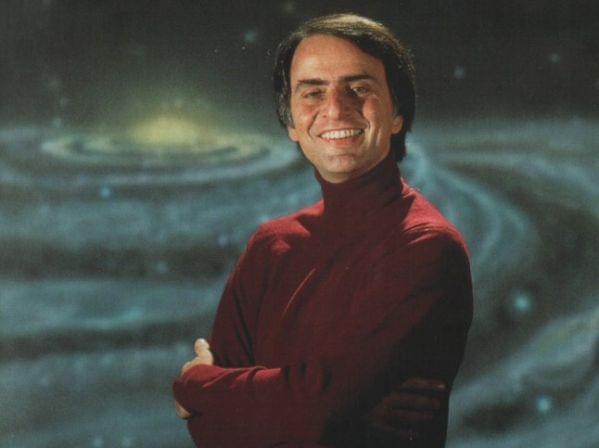A Voyage of (Re)discovery

Carl Sagan, host of the original "Cosmos."
Last night, the FOX network aired the first installment of its much-ballyhooed remake of Cosmos, the PBS science miniseries co-written and presented by astrophysicist Carl Sagan. It received decent audience numbers, averaging 5.79 million viewers according to Nielsen’s overnight measurements and coming in third among the broadcast networks. It was simulcast across nine other Fox-owned channels, so the final viewership should be higher, especially once DVR watching is factored in. (Updated: Hollywood Reporter wrote that the overnight ratings across all 10 channels came to 8.5 million, which they term "a modest haul, given the scope of the launch." Still, that should increase further over the week given repeat airings and DVR usage.)
So, good for science. Good for FOX. My question for the latter is this: what will you do next?
Just to make it perfectly clear, my views are my own, and not necessarily those of my employer or, in fact, anyone else. So, when I tell you that I was a little miffed when it was announced that astrophysicist Neil deGrasse Tyson was leaving his gig as the host of Nova scienceNow to team with Family Guy producer Seth McFarlane on a Cosmos reboot to air on FOX, well, that’s just me.
That said, it’s wonderful to see a commercial broadcast TV network lavishing money and promotional muscle on a science education series. And kudos to McFarlane for using his clout at FOX to get this program made. (According to an article in Current, PBS was contacted by the producers as a possible partner, but an agreement could not be reached.) It’s especially welcome these days, when science is so often treated as just another “he said, she said” difference of equally-valid opinions. (That Cosmos is airing on the sister network of one major source of such anti-science rhetoric is a bitter irony. And, no, they weren’t among the Fox-owned channels simulcasting it.
But, as I wrote above, what comes next? Does this represent a long-term commitment to science programming on FOX’s part? Or is it just a one-off prestige project?
Cosmos aired on PBS in 1980. But we didn’t stop there. That series, as remarkable as it was, was only part of a decades-long continuum of weekly science education that in turn involved Tyson and inspired McFarlane. Once the “spaceship of the imagination” has docked and the “cosmic calendar” has reached December 31st, we will still be here.

